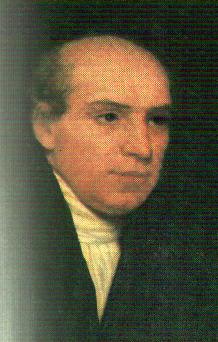
597
Death of Columba of Iona, influential Irish missionary to England. He had founded several monasteries which served as centers of faith and learning.
1790
Robert Robinson, born September 27th, 1735, and died June 9th, 1790, was an English Dissident, prominent Baptist, and thinker who made a lifelong examination of the history of Christian Baptism. He was the author of the hymn “Come Thou Fount of Every Blessing,” which he wrote after converting to Methodism at age 22.
Robinson was just a small boy when his dad died. In 18th-century England, there was little in the way of a social welfare system, which meant that he had to go to work while still very young. Without a father to guide and steady him, Robert fell in with bad companions.

One day his gang of rowdies harassed a drunken gypsy. Pouring liquor into her, they demanded she tells their fortunes for free. She pointed her finger at Robert and told him he would live to see his children and grandchildren. This struck a tender spot in his heart. “If I’m going to live to see my children and grandchildren,” he thought, “I’ll have to change my way of living. I can’t keep on like I’m going now.”
Biblical Warning
Robert Robinson decided to go hear the Methodist preacher George Whitefield. To cover his “weak” urge, he suggested the boys go with him and heckle the gathering. Whitefield preached on the text: “O generation of vipers, who hath warned you to flee from the wrath to come?” (Matthew 3:7). Robert left in dread, under a deep sense of sin that lasted for three years.
Preacher and Hymn Writer
Finally, at the age of twenty, Robert made peace with God and immediately became a Methodist preacher. Two years later, in 1757, he wrote a hymn that expressed his joy in his new faith:
Come, Thou Fount of every blessing,
Tune my heart to sing Thy grace
Streams of mercy, never ceasing,
Call for songs of loudest praise.
Teach me some melodious sonnet,
Sung by flaming tongues above.
Praise the mount! I’m fixed upon it,
Mount of Thy redeeming love.
This was printed the next year. At first people thought that Selina Hastings, the Countess of Huntingdon, a strong Methodist, had written this. Eventually, it was learned that Robert was the writer.
In the last stanza, Robert wrote:
Prone to wander, Lord, I feel it,
Prone to leave the God I love
Take my heart, O take and seal it
Seal it for thy courts above.
Prone to Wander
Prone to wander, Robert was. He left the Methodists and became a Baptist. Later on, having become a close friend of Joseph Priestly, he was accused of becoming a Unitarian. Priestly and other Unitarians denied the full divinity of Christ. However, in a sermon he preached after supposedly becoming a Unitarian, Robinson declared that Jesus was God and added, “Christ in Himself is a person infinitely lovely as both God and man.”
Robert Robinson died on this day, June 9, 1790. Had he left the God he loved? A widely-told but unverifiable story says that one day as he was riding in a stagecoach, a lady asked him what he thought of the hymn she was humming. He responded, “Madam, I am the poor unhappy man who wrote that hymn many years ago, and I would give a thousand worlds, if I had them, to enjoy the feelings I had then.”
1834
Death in Hooghly, West Bengal, India, of William Carey, the Baptist “Father of Modern Protestant Missions.”

1947
Death in Nairobi of Roland Allen, whose approach to creating indigenous missions will become prevalent later in the twentieth century.

